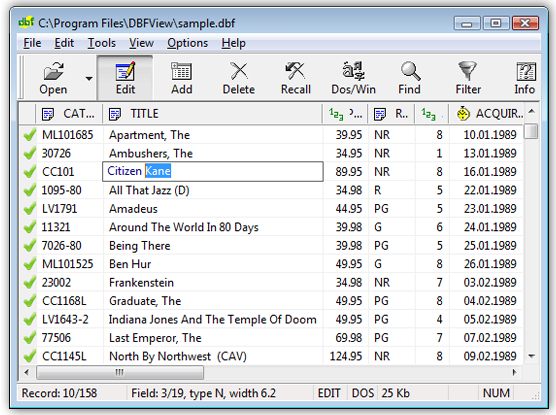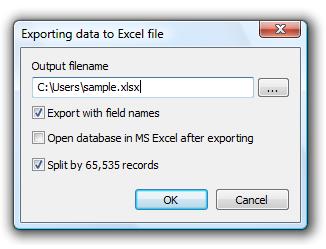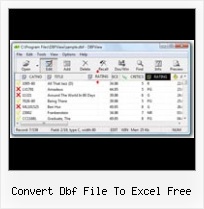DBF File Viewer

DBF Converter & DBF Viewer - the most popular
DBF editor and viewer for
Windows 9x/NT/2000/XP/Vista/Win7!
View dbf file, edit dbf file, and print dbf files!
DBF Converter & DBF File Viewer is a compact but powerful tool for viewing, editing, and printing DBF-format databases. DBF Converter & DBF Viewer uses its own database access tools and does not require external drivers for connection to databases (such as ODBC or BDE) or additional libraries (.OCX, .DLL). The program allows you to add, delete, recall, sort, zap, pack records, view and edit files in DOS or Windows character sets, get detailed database information, export to txt/html/csv/xls/xlsx format, and search in a file.
Overview
DBF Converter & DBF Viewer is a compact but powerful tool for viewing, editing, and printing DBF-format databases - screen shot.
It supports dBase, Clipper, FoxPro, Visual FoxPro and other DBF file formats. In contrast to many analogues, DBF Converter & DBF Viewer is completely a Windows 9x/NT/2000/XP/Vista program. The user friendly graphic makes working with databases simple and hassle free.
Most important parts of DBF Converter & DBF Viewer code are written in Assembler, therefore the basic operations performs fast and the .exe file is very small (only 410Kb!).
DBF Converter & DBF Viewer uses its own database access tools and does not require external drivers for connection to databases (such as ODBC or BDE) or additional libraries (.OCX, .DLL).
The program allows you to add, delete, recall, sort, zap, pack records, view and edit files in DOS or Windows character sets, get detailed database information,export dbf files to txt/html format, convert csv and xls / xlsx to dbf format, import/export from MS Excel (including MS Excel 2007!), and search in a file. DBF Converter & DBF Viewer comes with Installer/Uninstaller, documentation in HTML format, and sample files.
How to Use
Convert DBF to Excel 2007
Convert DBF to Excel 2007. Convert dbf to xlsx.
Saves the dbf database records a Microsoft Excel File xls / xlsx. If "Export with field names" is checked, the the output xls / xlsx file will contain field names. You can also open the output file automatically in MS Excel after the converting is done by selecting "Open database in MS Excel after exporting" checkbox.

If your file has more than 65.536 lines it will be split to several sheets (65.536 lines on each sheet).
ocx convert csv to xls Convert Dbf File To Excel FreeOrder DBF Converter & DBF Viewer for Windows
Ordering online is easy and secure. You can select the most suitable payment method: credit card, bank transfer, check, PayPal etc.. Paying a registration fee, you get the right to use the program for life and to get free updates within one year.
menu formato de excelPostal Address
For general help, troubleshooting and feature requests contact Customer Support at  . Make sure to include details on your operating system, browser, a link (or relevant code) and DBFView version.office 2007 dbf schreiben
. Make sure to include details on your operating system, browser, a link (or relevant code) and DBFView version.office 2007 dbf schreiben
Feedback
Henry Taylor - Software Developer
I don't do a lot of work with databases, but in connection with a research project I got hold of a CD with a 30-meg DBF file on it - 74,624 records, 23 fields, total of field widths 414 characters. At first I tried copying the file to the hard drive and reading it with Quattro Pro. This was possible, but it was slow, and pushed the program to an intolerable number of illegal errors leading to shutdown. So I went on the net and searched for DBF readers, hit apycom.com pretty soon, read the home page and decided DBFView sounded useful and inexpensive, downloaded it, and have found it to be very serviceable. The program was easy to install, reads quickly from the CD-ROM drive, finds individual records reliably and quickly enough for my purposes, and in general seems like a tremendous bargain.
Lisa C. Stopp - Finance Administrator
I am looking at your site regarding your product DBF View. We currently use Excel 2007 on XP operating systems. We save excel files as DBF IV format so that we can import them into other software that we use. Will this program work with Excel 2007 (.xlsx)?
Customer Support person
Yes, DBFView v3.2 supports import from Excel 2007 files (.XLSX files) to .dbf files.
Find more info about importing of XLSX files in DBFView here.
Ulrich Pfleghard - Software Manager
We have installed Access 2000, and the export data from access to dBase destructs actually all file structures (thank you, guys from MS!) of the DBase files in a manner that dBase doesn't recognize them as dBase files... I have to support an old Clipper/dBase based program. I was looking for a documentation tool for dBase because we still use a Clipper compiled programm that uses dBase files. Then I found Your program and thought i could see the structures of the files: I can! Hey fine! I also can see the contents of the files even if the Access derived files have a mistake in the second byte (at least) of the exported files. And I can modify the contents of the fields. Even better!
Screenshot
Awards
Blog
Bootstrap Breakpoints Working
Bootstrap Button groups grid
Bootstrap Layout Tutorial
Bootstrap Navbar Toggle
Bootstrap Jumbotron Class
More
Open DBF File
Edit DBF File
Export DBF to Excel
Convert DBF to CSV
Import XLSX files to DBF
Convert DBF to XLS
Convert DBF to Excel 2007
Convert XLS to DBF
Convert Csv To Dbf Format
Covertir Excel A Dbf
Open Office Membuka File Dbf
Dbf Convert Xlsx
Xls To Dbf File Converter
Xl To Dbf
Dbf Excell
Editor Dbf Freeware
Download Aplikasi File Dbf
Offices 2007 Dbf
Open Dbf Files In Access
Convert From Dbf To Csv
Using Dbf In Excel
Dbf File Creator









